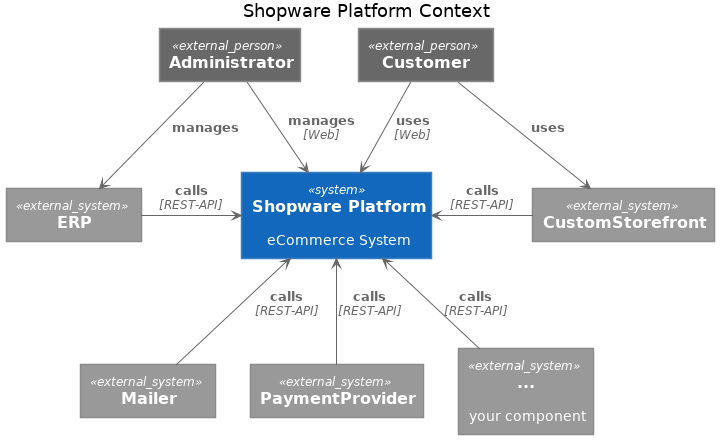Realize your ideas - fast and without friction.
Shopware 6 is an open source ecommerce platform based on a quite modern technology stack that is powered by Symfony and Vue.js. It's the successor of the very successful ecommerce shopping cart Shopware 5 which has over 800000 downloads. Shopware 6 is focused on an api-first approach, so it's quite easy to think in different sales channels and make ecommerce happen whereever you want it.
If you like Shopware 6, give us a star on Github ★
- Read the docs: https://docs.shopware.com/
- Start developing: https://github.com/shopware/development
- File an issue: https://issues.shopware.com
- Take a glimpse
- Technology
- Repository structure
- Installation
- Roadmap
- Community
- Ecosystem
- Academy
- Contribution
- License
- Authors
The Shopware 6 storefront is based on Twig and Bootstrap. Two well known and easy to learn frameworks, making the creation of templates a breeze!
The Shopware 6 Administration is based on Vue.js and twig.js, making the creation of new modules fast and easy. Get started with the design documentation.
The Rulebuilder makes the Implementation of business processes easy.
Designing content is fast and intuitive with the Shopping Experiences.
Shopware 6 provides Services through REST-APIs and rich user interfaces to customers and administrators alike.
The chart shows how the Shopware Platform fits into your enterprise. It provides web frontends for management and for commerce through a multitude of sales channels. It comes with a set of user facing interfaces and provides the ability to connect to your own infrastructure and outside services through REST-APIs.
More information can be found in the documentation.
Shopware 6 consists of multiple repositories, two of them are important to you
shopware/platformis a mono repository- This is where the shopware core is developed. You need it as dependency in your projects
- This is where you can participate in the development of Shopware through pull requests
- It's split into multiple repositories for production setups, all read-only
shopware/developmentis the development template- This is where your journey with shopware starts
- Installation see below!
A full installation guide covering different dev environments is available in the docs.
For the impatient reader, here is a tl;dr using docker
Let's start by cloning the development template:
> git clone git@github.com:shopware/development.gitYou now have the application template for the Shopware Platform in the directory development, we now change into it:
> cd developmentand clone the platform repository into its default directory platform. Note This is important for autoloading purposes.
> git clone git@github.com:shopware/platform.git
Build and start the containers:
> ./psh.phar docker:start
Access the application container:
> ./psh.phar docker:sshExecute the installer:
> ./psh.phar install This may take a while since many caches need to be generated on first execution, but only on first execution.
To be sure that the installation succeeded, just open the following url in your favorite browser: localhost:8000
Now you're all set to start developing your first plugin.
Shopware 6 will continue to evolve together with you and your feedback. This is our number one priority!
With openness as one of our core values, we will always provide you with a transparent overview of our product development.
The Shopware Roadmap shows you what we are working on, what we want to tackle next, and what visions we have for the future.
Take a look at the current roadmap here.
Shopware is an open source eCommerce platform that is built around the ideas and spirit of it's community - and you can take part in shaping the story of the product. In helping craft the future, you as a developer will grow as well.
Whether you're writing plugins, proposing code changes via pull requests, or exchanging ideas in Gitter or the Shopware Forum - you are a vital part of the source of inspiration we are proud to call the Shopware Community.
Join the community now 🖤
- Discuss: forum.shopware.com
- Chat: gitter.im/shopware/shopware
- Follow us on Twitter: @ShopwareDevs
 |
Moritz Naczenski Community Manager @m_naczenski |
 |
Niklas Dzösch Developer Evangelist developer@shopware.com Twitter: @ndzoesch |
Our Shopware Ecosystem gives you all the information you need to dive deep into the Shopware universe.
Whether plugin, theme or marketing tool: You can easily extend the functionality of your shop with over 3,500 available plugins in the Community Store.
Do you want to become a Shopware expert or get a sneak peek into the software? Find a training session that is individually tailored to your interests.
Held annually, the Shopware Community Day informs eCommerce enthusiasts from across Europe about the current state - and future - of digital commerce.
First of all - Every contribution is meaningful, so thank you for participating.
You want to participate in the development of shopware? There are many ways to contribute:
- Submitting pull requests
- Reporting issues on the issue tracker
- Discuss shopware on e.g Gitter or our forum
- Write a translation for shopware on crowdin
You have a question regarding contribution, or you want to contribute in another way?
Please write us an email: contributors@shopware.com
If you have decided to contribute code to Shopware and become a member of the Shopware community, we appreciate your hard work and want to handle it with the most possible respect. To ensure the quality of our code and our products we have created a guideline we all should endorse to. It helps you and us to collaborate. Following these guidelines will help us to integrate your changes in our daily workflow.
When submitting your code to Shopware you automatically need to sign our CLA (Contributor License Agreement). This CLA ensures that Shopware will stay an open and living product. In short, you give the explicit right to use your code in Shopware to shopware AG.
Shopware 6 is completely free and released under the MIT License.








